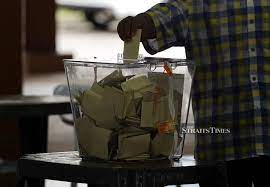By: Professor Dato' Dr. Ahmad Ibrahim, Tan Sri Omar Centre for STI Policy, UCSI University, Malaysia
N OV 19, 2022 was a historic day for us. We voted hoping for a more stable government after the instability of the last three to four years. Alas, after all the votes were counted, we were informed ofasplit. A hung Parliament was the outcome, with no clear winner. No political coalition could secure a simple majority of at least 112 seats. Come Nov 20, no government could be formalised. The coalitions had until 2pm on Monday to reach an agreement. This was later deferred to the same time Tuesday. As usual, there were some premature claims about securing enough support to form a government. All were quickly disposed of as fake. Many of these claims were made by netizens, who have grown impatient and dissatisfied with the long drawn-out affair. What is most distressing is the stand taken by some leaders, not much different from the little Napoleons that we have become used to, who have declared their unwillingness to work with certain parties. These are also the same leaders, who, before the election, declared their unequivocal support for the concept of “Keluarga Malaysia" and non-partisanship. Are such declarations mere rhetoric made just to fish for the most votes? Where is the statesmanship expected from our leaders? Have these representatives of the people forgotten the common agenda for the nation? Many citizens are baffled by what is now being played out in the negotiation process to secure a deal among parties for a workable government. Where has all the cry for a shared future gone to?
This is the first time that the country has been thrown into this state ofahung Parliament. But it is not new in many other countries around the world, including New Zealand, Canada, Germany and Belgium, to name a few. And unlike what we are witnessing now, all the other countries facing a similar situation have managed to sort out the stalemate pretty well. At the end of the d ay, the big g e r agenda than selfish party politics is the nation’s interests and wellbeing. We must be reminded that the 15th General Election is meant for the population to elect good leaders. The next stage is for the elected leaders to decide how best to form a stable government for the nation, not for any selfish political coalition. This is the time leaders demonstrated their statesmanship. Again, we must look at the big picture. What is the state of the nation now? How do we want the nation to look as we journey into the future? What policies do we need to put in place to secure the future we all desire? Listening to the many views and discourses in the media, it is clear that the nation is in chronic pain on many fronts. Our debt level, no thanks to the previous improperly planned borrowing, is running into unmanageable territory. Some are even saying that if we do not manage it well in the coming days, there is no stopping the country from sliding the way of Sri Lanka. We all know the sad episodes in neighbouring Sri Lanka. Like Sri Lanka, which is too dependent on tourism for its revenue, we are also too dependent on petroleum for the bulk of our income. The call to diversify the economy into more high-value-added and technology-driven sectors has yet to find traction with our leaders. We have yet to escape the low-cost labour-intensive economy. The worst is yet to come. 2023 has been proclaimed a recessionary year by literally all the authorities on the global economy. Inflation, they say, will bite hard on consumers. We need to be ready for this dep r e s s e d time. Energy prices are also expected to remain buoyant. Food prices are also rising. We can talk till kingdom come about how to improve our food security situation. Nothing has materialised except for the never-ending policy declarations and promises. Policies that never truly left the paper they were written on. Our foreign direct investments have also shown a declining trend compared with our neighbours. The country’s political insecurity is partly contributing to this malaise. What is certain is that we need change. No more of the same old stuff. And the only way to change is to appoint a new leadership team, one that has never been a part of the previous bank of ineffective leaders.
"Many citizens are baffled by what is now being played out in the negotiation process to secure a deal among parties for a workable government. Where has all the cry for a shared future gone to"



No comments:
Post a Comment